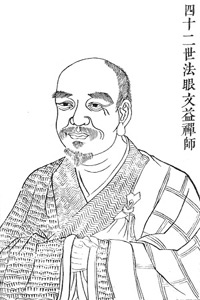Fayan Wenyi on:
[Wikipedia]
[Google]
[Amazon]
 Qingliang Wenyi (), Biography of the eminent monks of Song dynasty. Vol.13 also known as Fayan Wenyi ()Blue Cliff Records is a
Qingliang Wenyi (), Biography of the eminent monks of Song dynasty. Vol.13 also known as Fayan Wenyi ()Blue Cliff Records is a
 Qingliang Wenyi (), Biography of the eminent monks of Song dynasty. Vol.13 also known as Fayan Wenyi ()Blue Cliff Records is a
Qingliang Wenyi (), Biography of the eminent monks of Song dynasty. Vol.13 also known as Fayan Wenyi ()Blue Cliff Records is a Chinese Buddhist
Chinese Buddhism or Han Buddhism ( zh, s=汉传佛教, t=漢傳佛教, first=t, poj=Hàn-thoân Hu̍t-kàu, j=Hon3 Cyun4 Fat6 Gaau3, p=Hànchuán Fójiào) is a Chinese form of Mahayana Buddhism. The Chinese Buddhist canonJiang Wu, "The Chin ...
monk in the early 10th century. Wenyi was born in Yuhang (modern Hangzhou, Zhejiang). His secular surname is Lu. Fayan school
The Fayan school, or Fayan House () was one of the Five Houses of Chán, the major schools of Chan Buddhism during the later Tang dynasty.
History
Origins
The Fayan school was named after Chinese Zen Master Qingliang Wenyi (885–958).
Via X ...
, one of the main philosophical schools of Zen Buddhism
Zen (; from Chinese: '' Chán''; in Korean: ''Sŏn'', and Vietnamese: ''Thiền'') is a Mahayana Buddhist tradition that developed in China during the Tang dynasty by blending Indian Mahayana Buddhism, particularly Yogacara and Madhyamaka ph ...
was created by him.
Life
Wenyi became a Buddhist monk by the age of 7.Jingde Chuandenglu. Vol.24 His first tutor was Quanwei Chanbo. He followed monk Xijue to the Ashoka temple of Mingzhou (modern Ningbo, Zhejiang) where Xijue and Wenyi preached. He then traveled to the southern port city ofFuzhou
Fuzhou is the capital of Fujian, China. The city lies between the Min River (Fujian), Min River estuary to the south and the city of Ningde to the north. Together, Fuzhou and Ningde make up the Eastern Min, Mindong linguistic and cultural regi ...
in search of the solution of his doubts on the subject of Zen. In Fuzhou, Wenyi's knowledge gained him much popularity. However, he was not content with himself and thought that he had not detached himself from the secular world. His departure from Fuzhou eventually led him to Linchuan
Linchuan District () is one of two built-up areas (districts) of the city of Fuzhou, Jiangxi
; Gan: )
, translit_lang1_type2 =
, translit_lang1_info2 =
, translit_lang1_type3 =
, translit_lang1_info3 =
, image_map = Jiangxi in ...
. The tradition of Zen Buddhism holds that it was during this particular trip, Wenyi acquired great insight( 頓悟). Knowing that Wenyi is an accomplished Zen philosopher, the king of Nan Tang which ruled over the Linchuan region appointed a temple under his guidance. He would remain in the kingdom of Nan Tang for the rest of his life, promulgating the way of Zen. Wenyi died in the year 958. The King of Nan Tang ordered his royal subjects to wear white clothes for the mourning of Wenyi's death. A pagoda was built in Danyang in honor of Wenyi's spiritual accomplishments. His posthumous title "Zen master Dafayan"(大法眼禪師) was then granted.
Legacy
Wenyi is sometimes referred as Fayan Wenyi for his status as the founder of Fayan school of Zen. The Fayan school was listed as one of the five major schools of Zen Buddhism. Some of his pupils such as Tiantai Deshao, the patriarch of the Kingdom ofWuyue
Wuyue (; ) was a Dynasties in Chinese history, dynastic state of China and one of the Five Dynasties and Ten Kingdoms period#Ten Kingdoms, Ten Kingdoms during the Five Dynasties and Ten Kingdoms period of History of China, Chinese history. It wa ...
, Wensui, the Patriarch of Jiangnan
Jiangnan is a geographic area in China referring to lands immediately to the south of the lower reaches of the Yangtze River, including the southern part of its delta. The region encompasses the city of Shanghai, the southern part of Jiangsu ...
, and Huiju, Patriarch of Korea
Korea is a peninsular region in East Asia consisting of the Korean Peninsula, Jeju Island, and smaller islands. Since the end of World War II in 1945, it has been politically Division of Korea, divided at or near the 38th parallel north, 3 ...
made major contributions to the promotion of Zen Buddhism in different regions of China and Korea.
References
{{DEFAULTSORT:Wenyi, Qingliang Zen patriarchs Chinese scholars of Buddhism Chan patriarchs 958 deaths Year of birth unknown